Newer food and beverage packaging ventures are the future
Anantshree Chaturvedi, vice-chairman and CEO, Flex Films International, the global film manufacturing arm of Noida-based Uflex, discusses about the future of films, packaging and plastics in an interview with Rahul Kumar
19 Nov 2020 | By Rahul Kumar
Rahul Kumar (RK): What’s new at Flex Films?
Anantshree Chaturvedi (AC): Flex Films has state-of-the-art film manufacturing facilities in four continents — Asia, Europe, North America and Africa — with a cumulative production capacity in excess of 3,37,000 MT per annum. We are the only Indian origin company in the world to simultaneously expand into three new locations — Russia, Nigeria and Hungry. We are also expanding our existing capacities in Poland and Egypt.
We decided to shift our Middle East plant to Russia as we have a significant market share in the country. Russia is a huge country and the consumer appetite there is mature and aggressive. We saw it as the right time to enter the market. Shifting a plant isn’t easy, but it’s faster than ordering a new line. I am quite bullish about Russia and believe that it will expand faster than Nigeria and Hungry.
RK: How did you decide on the new locations?
AC: In 2013, when we established the US plant, we took few years to consolidate our existing facility. We made sure that we extracted excellence out of the facility. As it reached its full capacity, we improved our basic metrics of quality. We made sure that we provide value to our shareholders. For now, best possibilities out of the multiple opportunities we had were in Hungry, Nigeria and Russia. At the right time, there will be expansion in US as well.
Our plants run on demand and order basis. We don’t make jumbos and store them. That’s not a part of our business model. There are very few businesses that produce large jumbos and slit according to orders as they have strong distributors. We don’t do that though and instead sell directly to consumers. That’s why we have a global presence to serve clients locally.
RK: What are your expansion plans in the decided locations?
AC: In Hungry, we are investing 70 million euros. It will be a specialised polymer line catering to unique markets. In the long run, Hungry will be a regular line with a combination of PET, OPP, CPP and other films. Later, if a new substrate hits the market and finds acceptance, we will produce it as well at the plant.
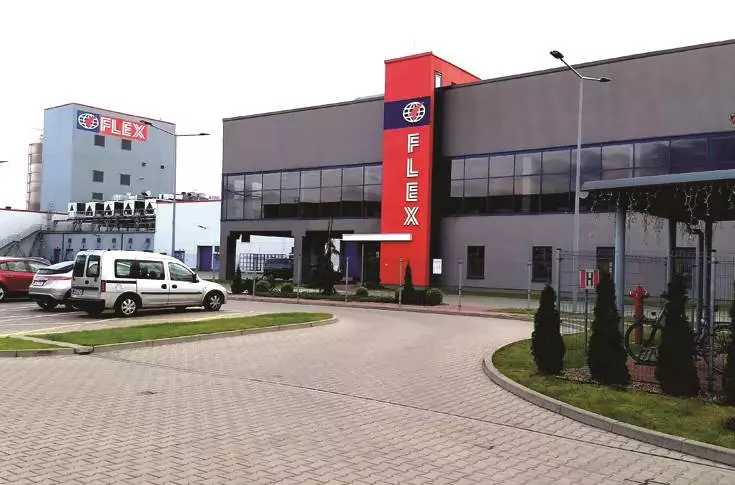
We are already in the African market with a plant in Egypt. Now, we are going to Central Africa with our Nigerian plant. Again, it will be a combination of OPP and PET lines. We will start with PET and then will go to other substrates.
In the future, all films we manufacture will be biodegradable, recyclable and sustainable.
RK: What about the Asian market?
AC: Currently, our presence is limited in South East Asia. In the next three-five years, we hope to establish a plant in that geography. We have strong competitors in the market, and thus, going to the market with a minor commodity product is not a good idea. One needs super specialised products for such markets. I believe, we have products in our portfolio that qualifies for the category and we will target that.
Also, mergers and acquisitions will be our strategy for the South East Asian market. Over time, different players will go up for sale and Uflex will be in the right place to make such acquisitions. I believe the polymer industry, especially PET, OPP, CPP films, will have a strong wave of consolidation in the next seven to 10 years, as it is happening in the global converting market today. For example, recently Amcor bought Bemis in the largest packaging deal in history. Meanwhile, Indorama Ventures bought DuPont Teijin and Jindal Poly bought ExxonMobil’s films business.
I believe we are going to see the first round of consolidation by 2025-26 and by 2028-2030, we will see large consolidations, to the tune to multimillion, if not multibillion deals. Initially, it will happen in the OPP segment because there are many players and the market is highly fragmented. Then it will transition into PET and later CPP segment.
RK: What is the difference between investment and ROI in India and overseas markets?
AC: ROI strategy for Uflex is simple whether it be investments in India or overseas. We are in B2B2C business space, not in infrastructure or in building something unique to Indian ecosystem. Though we are the largest in India, our ROI standards remain the same globally. There is no variation and wherever the investment may be, it is put through the same parameters. Though our company originated in India, our rules and systems are of global standards. We no longer get benefits of running businesses in different systems.
RK: And what’s new in the packaging sector?
AC: I think, we are seeing a significant growth in new Food and Beverage ventures. We are evaluating the segment and accordingly, we are changing our market and our production abilities to be able to cater to short run. To do it, we have decided to offer our best technologies to start-ups as opposed to large multinationals. This is the first step forward. We are actively doing partnerships with small, new-age ventures so that we can do some kind of new product development for specific needs.
Today, about 5-7% of Flex Film’s portfolio is of new ventures. In future, the number will climb up to 20-25%. My brother Apoorvshree and I are spending a lot of time looking at this segment and are looking to see how we can make the segment stronger for us.
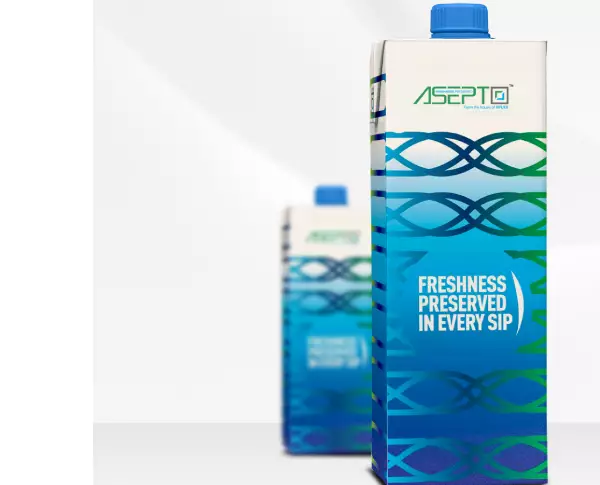
RK: Talking about beverage, what’s happening at the aseptic liquid packaging plant at Sanand, Gujarat?
AC: The plant is now coming to full capacity and is scaling up. We are looking to reach the full capacity soon, following which we will consider expansion, may be by 2021 onwards.
An important thing to take note of is that even though aseptic liquid packaging has been a new segment for us, we have the track record of developing successful new products which are eventually accepted well by the market. Take the example of our holographic aseptic packs, which was a concept introduced by Uflex. Now, the product has been accepted by the market and even our competitors have started offering them.
Anantshree’s view on global trends
Globally, sustainability is the top trend. While everyone is talking about it, we are beginning to see its adoption. I believe in the next two decades, all plastics will be recycled, and raw materials of all plastics will be recycled. Virgin resin for the use and manufacture of consumer-grade plastic will disappear. I may be taking a very conservative view, and it may happen sooner than that!
Sustainability is followed by the trend of minimum use. Youth today are going for minimalistic approach; they would rather buy less and use the product completely before discarding it. We are already beginning to see this in consumer phones. Nobody wants to buy an expensive phone, every year. As the trend continues, the fast-moving packaging cycle will slow down and one will be forced to make higher quality products, made from ecologically responsible resources, which are sensitive to demand and need.
The third trend is that the world is headed towards using services more than using products. The future growth is coming from service oriented businesses, where people will look at experiential consumption than product-based consumption.
RK: Let’s talk about your sustainability initiatives?
AC: We are the pioneers in adopting sustainable practices and that is well attested by the award we won way back in 1995 in Davos for mixed plastic waste recycling. We believe in approaching sustainability in a holistic manner. At Uflex, we are not only helping recycle multilayer polymers, but we also make new films out of recycled waste by the way of our PCR grade Asclepius project. We also have a pyrolysis plant in India.
This is what we are saying: Let us collect the waste from the environment and convert them into useful products. We want to keep the environment clean and at the same time re-apply them into a wide variety of products.
We also have other solutions on cards, though right now they are in an intellectual property development stage. However, in the foreseeable future these developments will help us tackle all kinds of biodegradability, not just oxo-biodegradability, such that plastic that doesn’t get collected, gets converted into biomass.
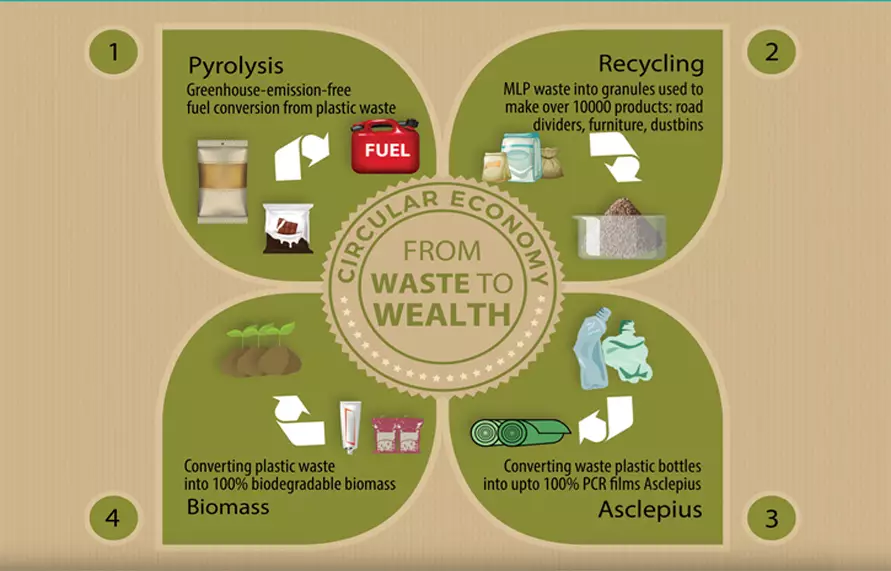
RK: Your take on plastics?
AC: At Uflex, we believe that plastic is a solvable problem. A single solution is not the answer to solving the problem. There have to be combinations of it to fix the issue. So, our mix of four technologies forms the pillars of Uflex global sustainability ‘Project Plastic Fix’ that we launched earlier.
In future, there will be other solutions that exist in the market which we are not making immediately, but we would like to incorporate them in our manufacturing when they get launched. These will be different and new kinds of coatings and adhesives to make polymer more sustainable. Then, there will be different solutions for inks to make the process of de-lamination and separation of molecules easier.
The fun side of Anantshree Chaturvedi

Anantshree is an ardent believer of the principle ‘Where focus goes, energy flows’. He is an avid reader of business and fiction books and an active learner. In all candour, he often quotes, “One of the things business school never taught me is that the biggest aspects of business are psychology and motivation.”
He enjoys watching movies and listening to all kinds of music during his downtime. He is a foodie and addicted to the experiences offered by travel whether is by a quick drive around his current hometown or a flight across the world. Most of all he believes that progress in every front, mental, physical and spiritual, is the material definition of human happiness and this must be the core focus of every human being.
RK: So you are making packaging more sustainable by keeping plastics in the economy and out of the environment.
AC: Yes. Our multilayer recycling machine is a good example of that. We can take any type of multilayer plastic waste and recycle it, process it and turn them into granules and make 10,000 different kinds of products out of this new material, everything from road barriers to furniture to automotive parts. This essentially takes plastic out of the environment, reprocesses it and puts it back into the economy. See, one sells the products made from the raw material which has already been sold once and had a trickle-down effect of entering the economy as positive revenue once now re-enters the economy.
Like I said, plastic is a problem, and yes, I agree, if plastic were to be introduced today, it would be construed as a green technology, as the cost of making plastic is cheaper than making paper or glass. But unfortunately, plastic requires discipline. And what we have seen in the last couple of years is that this discipline is hard to come by. But I do strongly believe that in the future we will be able to say that plastic ‘was’ a problem that ‘has now been’ resolved.
RK: What do you think Indian brand owners and converters need to do for responsible packaging?
AC: I think more than brands or converters, it’s the consumer who will decide the shift towards responsible packaging. I believe if a product is made out of unrecyclable plastic, or hard to recycle substrate, or substrate that is not optimal, it will see fewer and fewer sales numbers due to consumers refusing that product. As the sales numbers suffer, the makers of products will automatically change.
I believe that large brands and converters that are interested in adopting responsible packaging today, need to recognise that this is the future of plastic and there is no other alternative to it!
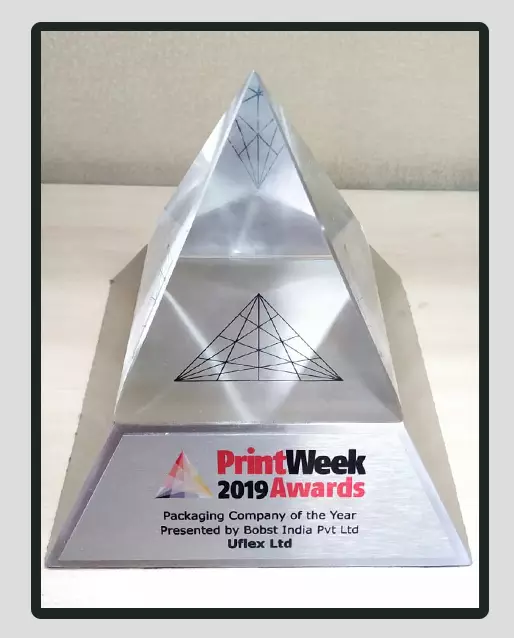 Uflex was the joint winner for the PrintWeek Packaging Company of the Year Award
Uflex was the joint winner for the PrintWeek Packaging Company of the Year Award
Uflex has won the accolade on the basis of a solid financial performance. The company’s gross sales and profit before tax has also increased.
In the converter division, the Uflex team has been specialising with 3D and 4D pouches with re-closable options, as well as wicketed bags for baby and hygiene markets with handle, pet food pinch bottom bags, cement block bottom bags, flexitubes, lids, confectionery foils, embossed foils, hygiene films, inno-lok pouches, pocket PTC zipper, spot embossing, electron beam curing, and cast and cure technologies.


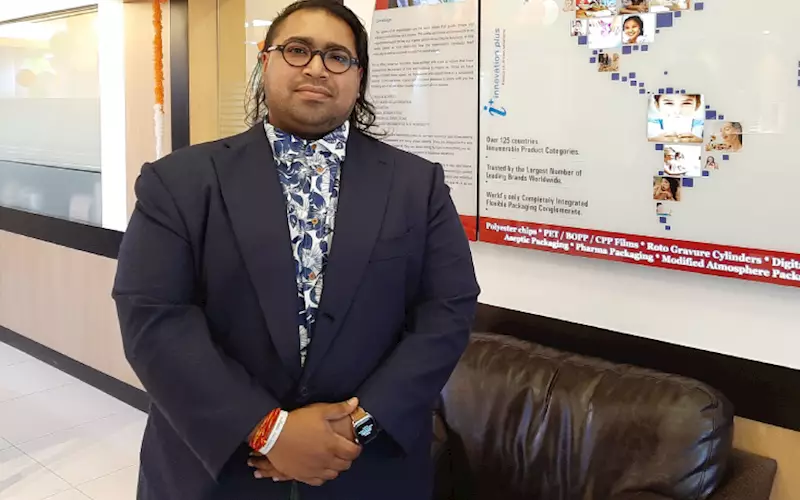
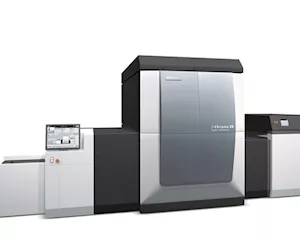
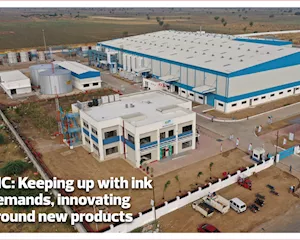
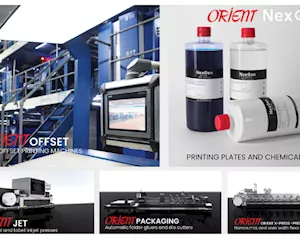
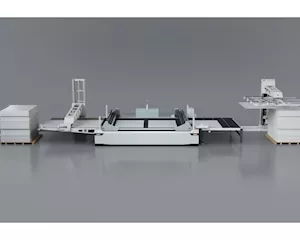
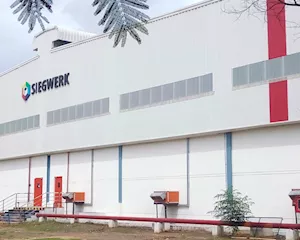






 See All
See All